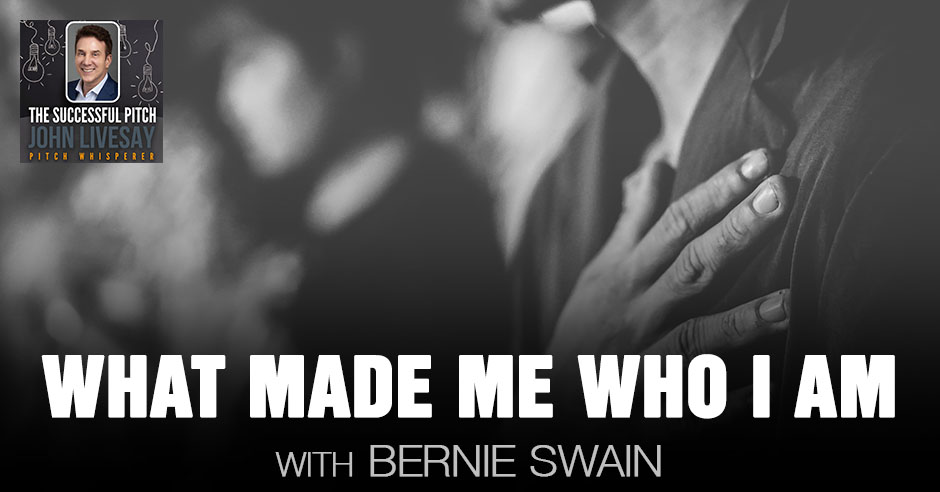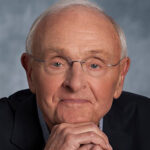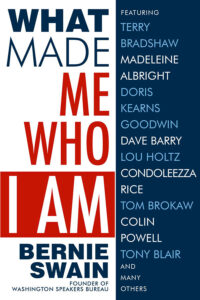What Made Me Who I Am With Bernie Swain
Posted by John Livesay in podcast0 comments

Episode Summary
 Today’s guest on The Successful Pitch is Bernie Swain, the author of “What Made Me Who I Am”. He’s the founder of the Washington Speakers Bureau, which represents famous presidents, Tony Blair, Condoleezza Rice, athletes, Tom Brokaw, and he talks about how he started his agency, how long he had to wait while working out of a closet to get his first client, and the resilience it takes to become an entrepreneur. He said, “Passion is much more important than talent, and a pitch works when it’s real and authentic. Really, there’s no short-term path to long-term success.” He said, “You’ll never be happy until you control your own destiny.”
Today’s guest on The Successful Pitch is Bernie Swain, the author of “What Made Me Who I Am”. He’s the founder of the Washington Speakers Bureau, which represents famous presidents, Tony Blair, Condoleezza Rice, athletes, Tom Brokaw, and he talks about how he started his agency, how long he had to wait while working out of a closet to get his first client, and the resilience it takes to become an entrepreneur. He said, “Passion is much more important than talent, and a pitch works when it’s real and authentic. Really, there’s no short-term path to long-term success.” He said, “You’ll never be happy until you control your own destiny.”
Listen To The Episode Here
What Made Me Who I Am With Bernie Swain
Hi and welcome to The Successful Pitch. Today I’m honored, and quite honestly very thrilled, to have Bernie Swain as my guest today. He’s the co-founder of the Washington Speakers Bureau and today’s foremost authority on the lecture industry. Over the past 35 years, Swain has represented former US presidents, American and world leaders, journalists, authors, business visionaries, and sports legends. He’s got a wonderful new book out called “What Made Me Who I Am”. I highly recommend it. I’ve enjoyed every single chapter. Bernie, welcome to the show.
Thank you. This is an honor. Thank you, John.
Well, your background of coming from a family of humble beginnings definitely resonates with me. My grandfather was a coal miner and I know that that really resonates with your roots, but I always love to ask my guests to take us back to their own story of origin. Feel free to start in any way you’d like as to whether it’s your parents or your own big decisions that you had to make in your career, but how did you get to be who you are?
Well, John, my parents were like yours. They were from Virginia and West Virginia. My mother’s side, they were farmers in Virginia. My father’s side, they lived in the poorest of mining towns in West Virginia and in a two-room house with five sisters, a brother, and assorted relatives who came and went. My father spent part of his childhood, when my grandmother couldn’t always take of care of him, in an orphanage. No one in my family ever went to college before. They were good people, but there was never any conversation in my family about going to college, even when I was a junior and senior in high school.
I had a mentor, one of those first turning points in my life. He was a teacher. He was the athletic director, the football coach at the high school, and everyone looked up to him. I wanted to be just like him. In fact, I was not only inspired by him, but I started a 17-year career based on following in his footsteps. At 36 years old, I was offered the job as the athletic director at George Washington University.
About the same time, a friend of mine had sent me a copy of Fortune Magazine, and in the magazine was an article about the largest lecture agency in the world. They had just walked into the Ford White House and picked up Gerald Ford, Henry Kissinger, and Alexander Hague as clients. Near the end of the article, Henry Kissinger is quoted, complaining about the high commission rate that this agency wanted to charge and saying, “Well, why simply don’t I sign with one of your competitors?” The agency president said, “Well, I have no competitors.”
I took the article home and I put it on the coffee table, thinking I would probably look at the rest of the articles in the magazine, and a couple of days later, I came home and my wife said, “Have you read the article in this magazine? He has no competition.” She sat me down and she said, “You come home two or three times a week and you complain about the bureaucracy of university life, and I don’t think you’ll ever be happy unless you can make decisions on your own.” Over a period of weeks, she pushed and she prodded me and convinced me to walk away from my dream job as an athletic director at a university.
We had no money. We certainly had no experience. We had no plan in order to start our company and to get money to live on. My wife had been making $11,000 a year and I’d only been making $33,000 as the assistant athletic director. In order to get money, we put a second mortgage on our home, and now we had $55,000 of mortgages on a $60,000 house, above 12% interest rate. As I said, we had no money, but then a friend of ours offered to rent us his stationery closet as our first office. To give you an idea what it was like to live in a stationery closet, the person whose office of the stationery closet it was was Chuck Hagel, who would later become Barack Obama’s secretary of defense.
Well, you never know who you’re talking to, do you.
No.
I want to take a moment and just dwell on what Paula said to you, which is you’ll never truly be happy until you control your own destiny. We’re going to tweet that out. It’s such a great line, and I think that’s a pivotal moment for everyone listening, is is that true for you? If it is and you choose happiness over security … because that’s the choice you were having to make, isn’t it, Bernie?
 Source: Pexels
Source: Pexels
[Tweet “You’ll never truly be happy until you control your own destiny.”]
Yeah, it is. I learned later on, because of some of the people I represented, that there are turning points like my happening to find a mentor in high school. There are turning points in life where if we slow down and we pay attention to these turning points or these forks in the road, we can make good decisions to go one way or the other. The great legendary catcher of the New York Yankees Yogi Berra once said, “I get to a fork in a road, one of these turning points, and I take it.” Unfortunately, that’s what most of us do. We miss these forks in the road. We miss these turning points in life where we can go in one direction or another. I was fortunate, without giving much thought to it, to pay attention to two people in my life early, the high school teacher and my wife, who saw something in me that I didn’t see in myself.
Isn’t that great.
I think that’s the key to success in anything we do, is to listen to others who can see something that we don’t see.
What a great gift. Well, so let’s go back. You’re working out of a closet. You’re in debt up to your ears. You don’t have a lot of experience. Now we’re going, “Okay. We’ve got the Washington Speakers Bureau. Surely we’ll be getting a speaker any day now.” Pick up the story there, because it’s a doozy.
Well, as you said, we had no experience, and so we would sit in this closet and we would try to think of famous names to represent. We were trying to get a telephone number, and none of our calls were ever returned, and our letters were returned from lawyers who said, “My client, this famous person, is under a written contract with another agency. Don’t write them again or we’ll sue you.” You have to remember back in 1980, there was no internet. There was no way for us to determine whether that quote, where, “I have no competition”, was true. Because of those letters, we discovered there were actually five or six other large agencies up and down the east coast of the United States in addition to this one large agency.
We sat in that closet for 12 months, and, really, nothing had changed. We didn’t represent anyone, we had discovered there was competition we did not know existed before, and we were about out of money. Two months more passes, we had been in there for 14 months in this closet, and I get a call from a guy named Steve Bell, who was an anchorman for a news show that started in 1975 called Good Morning America. I had briefly met Steve when I was at the university, I let him use the swimming pool. Steve had been under one of those written contracts. That agency had not fulfilled their obligation to him. The contract had expired.
Steve called me on the phone and said, “I heard that you started a speakers bureau. If you want, I’ll give you a chance.” I went over to his office and I shook hands, and on the way back, I suddenly realized that I had not signed him to a written contract. When I got back to the closet, I tried to justify it to my wife, Paula, by saying, “Well, what good will it do to hold him to a piece of paper if he’s not happy?” That mistake on my part, that error in judgment at the moment, turned into be a defining moment for us because Steve then went and told other journalists, his friends, that if you don’t want to be tied up to a written contract with an agency, you can go shake hands with these new little guys in town and walk out on them any time you want.
 Source: Pexels
Source: Pexels
[Tweet “What is your defining moment?”]
Well, there’s the defining moment, everybody. That’s the branding. That’s what separates you from the competition. Because everybody’s always asking startups, especially when they’re trying to get funding, “What’s your secret sauce? What separates you from the competition?” And you just gave it that. The question that you need to ask yourself, listeners, is, “What’s my defining moment in my story of origin?” Because those 12, 14 months, I know you’ve said to yourself, “What have I done?” How did you keep going, Bernie? How did you and Paula keep the faith that this was going to work out?
Well, you’re exactly right when you talk about finding that brand, that moment. Sometimes it happens by mistake and sometimes you can identify it in the beginning. The key to it, once you find that branding, is to be truthful to it. It’s to stay with it. I remember about a year and a half passed after I shook his hands, and no other agency that we competed against went to handshakes. They were still signing people to written contracts.
I remember one day I was sitting at my desk and thinking of ways that I could cut corners. “Let’s give up these handshakes. Let’s tie people up. Why worry about whether they’re going to walk out on us? Does it really make a difference? Do people really care about the truth and the faith and the honesty that those handshakes brought for us?” Then, at the same time, I get a letter from a coach at the University of Minnesota named Lou Holtz, who went on to Notre Dame, and in the letter, at the bottom, it said, “I ask of you three questions. Can I trust you? Are you committed to excellence? Do you care about me?”
Now, these were things that Lou Holtz put in every bit of correspondence he ever wrote, so it would be easy to forget it and just pass by it. I remember putting the letter to file it away on my desk, and it sat there for a day and then it sat there for several days. I finally picked it up and I read it again, and it said, “Can I trust you? Are you committed to excellence? Do you care about me?” The very reasons those handshakes worked and the very reasons I started the company in the first place, what that lesson taught me was there’s no short-term path to long-term success. Those handshakes created a brand for me, and it would be foolish for me to give up on that.
That’s a good quote, too. There’s no short-term path to long-term success. We’re going to tweet that out as well. I love those three questions. I find when I work with clients, helping them with their pitch, whether it’s to get funded or to get a new client, that that first question that clients have or investors have is, “Do I trust you?” It’s a fight or flight thing. Is it safe to be in your presence? Are you going to stab me in the back? Or is this someone I want to work with? Then, this commitment to excellence. That really shows up in so many ways. Keeping your word, as you said. If you’re going to say, “We run our business on a handshake,” then you have to keep doing that. Finally, the big one is, “Do you care about me?” Whether you’re listening to someone give a keynote talk or pitch to get someone to hire you, ultimately one of the questions people have after they trust and like you is, “How committed are you to making me look good?” Or, “What extra mile are you going to go for me?”
 Source: Pexels
Source: Pexels
[Tweet “No short term path to long term success”]
Right.
I just love what you said.
I put that letter in plastic and I look at it every several weeks, because I want to remind myself what’s really important in life. We’ve been in business now for 37 years, so over a 37-year period, we’ve never signed a speaker, including three United States presidents and six prime ministers of Great Britain and countless secretaries of state, authors, journalists.
Right.
None of them have been signed by a contract. It’s all been on a handshake.
Isn’t that great. I want to ask the story. Again, the book is “What Made Me Who I Am”. and there’s a riveting story of how you got your first president, Former President Ronald Reagan, to pick you versus much larger agencies that he could’ve gone with after he stopped being president and was going to be a speaker. I think it goes full circle to how we opened the interview today, Bernie, which was who you are, what your values are, what your background is, and how that resonated with Former President Reagan.
Yes. This story shows how powerful it is to have a great reputation no matter what you do. There is nothing more important in your life. We were one of 30 agencies that got a letter asking if we would interview to represent Ronald Reagan when he left office. They were all the big agencies, all bigger than we were. They were Hollywood agencies because Ronald Reagan had been an actor in Hollywood. The idea was that you would take 30 agencies and whittle it down after one interview to 15 and then down to seven, and the top two choices would be given to President and Mrs. Reagan for them to make the choice.
After our final interview, we heard nothing for two months. Washington’s a very gossipy town, so usually you can find out something. You can call somebody on the phone and they can usually say, “Well, here’s what I think is going on,” but nobody could figure out anything. Everything was totally silent. I get a call one day from Fred Ryan, who was the chief of staff of Ronald Reagan and was now a publisher for The Washington Post, and I braced myself for the bad news. I envisaged this conversation by Fred saying, “Well, Bernie, you’ve done a great job, you’ve got to be proud of what you’ve accomplished in nine years, you have a good reputation, but I hope you understand we must go with more experienced people.”
I got on the phone and I braced myself for that bad news, and Fred Ryan got right to the point. “Bernie, President and Mrs. Reagan have selected you to represent them.” I sat there at my desk totally surprised. I did not know what to say, so I promised to do a good job. I told him we’d be in touch in the next day and I hung up the phone. I remember sitting there at my desk that day thinking how totally amazing that a president of the United States would risk his legacy on a totally inexperienced group of people.
But over the years, as I got to know him, I came to understand how this all happened. He was a believer in entrepreneurism and the little guy, and true to the fundamentals that he had been taught young in life. I remember asking Fred Ryan how this all happened later on, and Fred said, “President and Mrs. Reagan recognized that you were young entrepreneurs. They recognized that you had a good reputation. They simply wanted to give you a chance.”
Wow. What a great, great story. Again there’s a theme that I’m hearing, and when I read your book it’s really stuck out with me, was you had to wait 14 months to get your first speaker. Then, after your big pitch to represent President Reagan, you had to wait two months. There’s some skillset there of resilience and maybe a little bit of releasing the attachment to the outcome is what I call it, that I think would be really valuable. I want to ask you about those two situations, because it’s a skill that everybody can use, whether you’re an entrepreneur or working for someone else. After you give a pitch to get hired, to get someone to hire you or to get your startup funded, there’s a waiting period before you hear the yay or nay. Any insights there, Bernie, on how to deal with that time in between?
For some reason, I found it very easy for me to sit down and talk to the president of the United States or Margaret Thatcher, prime minister of Great Britain or Colin Powell or other people who had far exceeded what they accomplished in life than I had, and I did so because the thing about making a pitch is that the pitch is real if it’s based on the life that you live and the way you go about your business and the way you treat other people. If you have a good reputation and you care about other people, then the pitch is really from the heart. It’s not trying to talk somebody into something by creating a set of facts that may or may not exist.
I always found myself talking about family and relationships when I sat down with other people because those are the most important things for all of us in our lives. It is the reason we’re in business in the first place. If we think that we’re in business in order to make ourselves look better or to give ourselves a better reputation, then we’re not going to succeed. We succeed in life because we’re trying to do something good for other people. Other people may be our customers, they may be our family, they may be our employees, but if we put those people first, then the pitches we make in life, no matter whether we’re talking to that customer one-on-one or are pitching to a famous speaker or not, they ring true.
I love that, because so many people have the imposter syndrome, right? You start comparing yourself. “I haven’t done nearly as much as what that person has done,” or, “This is a really big client or a client big investor, and why would they hire little old me?” When you get out of trying to compare yourself to other people and go into what you said, being authentic and talking about relationships and what’s important to you, then you’re talking to people as other people and not about their accomplishments. Would that be a fair summary of what you said?
Excellent. Exactly what I meant.
Terrific. Now, there’s a wonderful story in here that I love about James Carville, which he talks about watching his mother sell. He said, “Mama taught me there’s honor in being a good salesperson, especially when you’re selling a worthy product.” He took that life lesson and said, “Politics is all about selling.” Would you take us back to paint that picture of where he got that life lesson?
Well, they grew up in a very small town in Carville, named not because of their family but because for other reasons, but his mother was, as he said, one of the greatest salespeople he ever knew. She would sell World Book Encyclopedia door to door, and she would take young James whenever she went somewhere. I remember she would say, “Now, James, look for the house that has a bicycle and a boat, a vast boat parked in the front.” James would say, “Well, how come, mom?” She would say, “Well, the bicycle means the family has kids, and therefore the encyclopedia means something to them. The boat means they have enough money to buy the boat.”
She would go in there and she would sit down, and she would start asking, saying the virtues of getting the encyclopedia and how important it was. She would start to ask James some questions, and James would answer, “Yes, the capital of this state is this,” or, “The French Revolution was at this time.” Most often, the lady of the house where the husband was away would say, “Well, I don’t know whether we can do this or not. We have a lot of expenses.” The lady would say, “Well, if you have kids, there’s nothing more important than getting the encyclopedia to teach them knowledge.” They would say, “Well, I’m not sure. We’re struggling.” Well, if you have a boat, then you have the money to invest in those children. It was a well thought out plan by his mother that taught him how important it was to think about selling and the importance of doing a good job selling.
What I love about that story is she qualified. She wasn’t just going door to door, she knew that her buyer had to have kids and had to have enough money to afford the encyclopedias, and that’s so important when you pitch, is to do your due diligence and do your research to see if this potential client is a good fit. That all comes down to knowing who this is for and who it’s not for, right?
Exactly. Knowing your customer.
I love it.
That applies to almost everything. Knowing your customer is so important for the success of any company.
Well, there’s so many great interviews in the book. Again, “What Made Me Who I Am”. Let’s jump to Condoleezza Rice, because she’s always fascinated me with this discipline and focus from being an ice skater to her career in politics.
Right. Well, Condi Rice came from a long line of slaves and, quite surprisingly, a family of ministers. Her grandfather was a great believer in knowledge. They had absolutely no money, and he took what was virtually all the money they had and bought this set of books. His wife, her grandmother, tried to talk him out of getting the books because they really couldn’t afford them, and he insisted on keeping the books because he believes so intently on knowledge and education. That idea of education and believing in knowledge was passed down over the generations. In the book, it’s an example of a turning point in life that can sustain generations. Condi, she is incredibly bright, and she is the provost of Stanford today. All of this is because of one turning point two generations before she was born that happened in her life.
Amazing. Well, I think I would be remiss if I didn’t ask you what advice you have for professional speakers who may not be a famous president or athlete or something along those lines, because you’ve obviously managed a lot of successful people’s careers. What advice do you have for speakers who want to get in an agency like yours but they’re not famous? What would you say to them?
Well, first I will say if you get a chance, go to my website, BernieSwain.com, because in there is a blog that I created called 10 Steps to Get a Speaker’s Bureau Interested In You. One of the most important things in this is that you need to find your own story. It goes back to what I’ve always believed in, in that there are turning points in life. I’ve simply started a lecture agency, but I found a great deal of turning points in my life that create a story for me.
What you need to do as a potential speaker is to find out what in your life, what were the turning points in your life? What created that story for you that made you unique? What do you have to say to others that can change lives? I think that’s the fundamental importance of anybody who’s going out and speaking. It doesn’t do any good to go and find 10 great business ideas and then take those ideas that have been said 100 times and use them. It all comes from inside you. What are the turning points in your life? What are those powerful influences, those defining moments, those people who come into your life, those unexpected events that you experience, those moments in time? If you can find those, then you can create and you can share your story with others.
Got it. Well, my final question to you is how did you come up with the title of your book, “What Made Me Who I Am”?
The people in the book that I think I explained to you earlier before we started the broadcast are people that are older, that I grew up with. What I’m trying to reach are younger people today and entrepreneurs, people in their 20s and 30s who are either starting something new, want to start something new, or they’re in the middle of something and maybe they’re struggling a little bit. Because I want to give good examples in life, people who took adversity and difficult times and changes in their lives and how they reacted to those turning points.
I want to tell the people how important these turning points are, how important it is for us, no matter how small that fork in the road is, to slow down a bit and make good and wise decisions. Because we can look back on life and say, “Gee, I wish I had done this,” but when you’re young and you’re starting out and you’re becoming an entrepreneur or whatever you want to do in life, isn’t it better to discover those moments in time that you can make the right decision before you have to look back and say, “I wish I had done that”?
No regrets, right? Take some risks.
Right.
Well, Bernie, this has been amazing. We’re going to put the link to buy your book, “What Made Me Who I Am,” in the show notes. We’re going to put the link to your website, BernieSwain.com. On Twitter, if people want to follow you, your Twitter handle is @Swain_Bernie. Are there any final thoughts you want to leave us with?
I will say one thing, and you alluded to it a little bit earlier, is that how did we survive in that closet for 14 months without absolutely any success? Why did we sit there for two months when we didn’t think we were going to get Ronald Reagan and we were just simply waiting for who got him and how disappointed we were going to be? The thing is I had no idea I would be good at this. What is important in life for any entrepreneur is passion is more important than talent. It’s important to realize that. You’ve got to say it over and over again. You’ve got to believe in what you do and you have confidence in yourself. Passion is more important than talent.
Well, that’s my favorite quote of the day. We’ll tweet that out as well. What a great way to end the episode. Passion is, in fact, more important than talent. You’re a living example of that. I can feel your passion talking with you. I can feel your passion reading the book. Everyone, get that book “What Made Me Who I Am”. Thanks again, Bernie.
 Source: Pexels
Source: Pexels
[Tweet “Passion is more important than talent”]
Thank you, John.
Links Mentioned
- Book: “What Made Me Who I Am”
- Website: BernieSwain.com
- Twitter: @Swain_Bernie
Wanna Host Your Own Podcast?
Click here to see how my friends at Predictive ROI can help
Fox 11 News Los Angeles John Livesay The Successful Pitch book
Share The Show
Did you enjoy the show? I’d love it if you subscribed today and left us a 5-star review!
-
- Click this link
- Click on the ‘Subscribe’ button below the artwork
- Go to the ‘Ratings and Reviews’ section
- Click on ‘Write a Review’
- JohnLivesay.com
- John Livesay Facebook
- John Livesay Twitter
- John Livesay LinkedIn
- John Livesay YouTube

